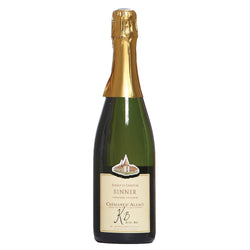Lo sfondo è il suggestivo paesaggio alsaziano, il protagonista è il Domaine Christian Binner. Nel 1770, ad Ammerschwihr, in Alsazia, ebbe inizio la storia di questo Domaine, che si espande per 10 ettari di vigneti, dove la famiglia Binner produce annualmente diverse annate derivanti dalla combinazione di diverse varietà di uva e Cru dell'Alsazia. Oggi Christian ha preso con cura in mano la successione delle vigne e della cantina, conducendoli secondo i principi della biodinamica. “Essere un contadino del XXI secolo richiede un grande rigore e una vasta conoscenza, per dare tutta l'attenzione necessaria al pieno sviluppo della vite e al benessere dei lieviti in cantina, per la costituzione più complessa del succo d'uva. Ci vuole maggiore attenzione, cura e dedizione per ottenere un prodotto che nutre la mente e il corpo, capace di suscitare emozioni e rimanere digeribile” dice Christian ed il suolo alsaziano è ancora una terra volta all’elezione per i vini naturali.Tra i filari le rese sono ridotte al minimo e le viti non conoscono né erbicidi né tantomeno fertilizzanti chimici. La vendemmia, esclusivamente manuale, avviene solo a completa maturazione delle uve. Si lavorano vitigni quali il Riesling, Pinot Gris, Pinot Noir, Muscat e Gewürztraminer sempre rispettando al massimo quello che è stato il lavoro della natura. La vinificazione segue un percorso senza input enologici: la trasformazione del succo d'uva in vino avviene in modo "naturale”, pressatura lenta, fermentazioni con lieviti indigeni e a bassa temperatura, tutto lasciato invecchiare in botti di rovere. Sfruttando anche la biodiversità circostante si producono anche delle varietà di acquaviti. È così che in questo quadro edonistico emergono alcuni tra i vini più importanti dell’Alsazia.
Lo sfondo è il suggestivo paesaggio alsaziano, il protagonista è il Domaine Christian Binner. Nel 1770, ad Ammerschwihr, in Alsazia, ebbe inizio la storia di questo Domaine, che si espande per 10 ettari di vigneti, dove la famiglia Binner produce annualmente diverse annate derivanti dalla combinazione di diverse varietà di uva e Cru dell'Alsazia. Oggi Christian ha preso con cura in mano la successione delle vigne e della cantina, conducendoli secondo i principi della biodinamica. “Essere un contadino del XXI secolo richiede un grande rigore e una vasta conoscenza, per dare tutta l'attenzione necessaria al pieno sviluppo della vite e al benessere dei lieviti in cantina, per la costituzione più complessa del succo d'uva. Ci vuole maggiore attenzione, cura e dedizione per ottenere un prodotto che nutre la mente e il corpo, capace di suscitare emozioni e rimanere digeribile” dice Christian ed il suolo alsaziano è ancora una terra volta all’elezione per i vini naturali.Tra i filari le rese sono ridotte al minimo e le viti non conoscono né erbicidi né tantomeno fertilizzanti chimici. La vendemmia, esclusivamente manuale, avviene solo a completa maturazione delle uve. Si lavorano vitigni quali il Riesling, Pinot Gris, Pinot Noir, Muscat e Gewürztraminer sempre rispettando al massimo quello che è stato il lavoro della natura. La vinificazione segue un percorso senza input enologici: la trasformazione del succo d'uva in vino avviene in modo "naturale”, pressatura lenta, fermentazioni con lieviti indigeni e a bassa temperatura, tutto lasciato invecchiare in botti di rovere. Sfruttando anche la biodiversità circostante si producono anche delle varietà di acquaviti. È così che in questo quadro edonistico emergono alcuni tra i vini più importanti dell’Alsazia.



